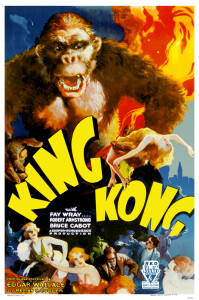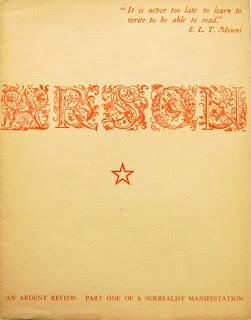Found in a box of papers – this two page typewritten carbon copy of a 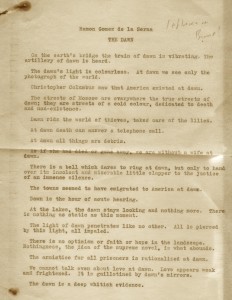 poem entitled ‘The Dawn’ by the famous Spanish experimental writer Ramón Gómez de la Serna translated into English by Diego Marin ( author of Poesia Espanola, 1962) and Tomas Bartroli (fl. 1969). It would be interesting to discover its provenance.
poem entitled ‘The Dawn’ by the famous Spanish experimental writer Ramón Gómez de la Serna translated into English by Diego Marin ( author of Poesia Espanola, 1962) and Tomas Bartroli (fl. 1969). It would be interesting to discover its provenance.
In his time Gomez (1888 – 1963) was arguably the most celebrated experimental writer in Spain. Born in Madrid to a middle-class family, he refused to follow his wealthy father into law and politics, resolving instead to adopt the bohemian lifestyle of an experimental writer, and subsequently he began contributing to many of the avant-garde magazines of the period.
Like Sartre in Paris, years later, he established a literary salon in Madrid’s Café Pombo and during the First World War brought out six collections of experimental poems—El Rastro, El Doctor Inverosimil, Greguerias, Senos, Pombo and El Circo. Thereafter he continued to publish experimental writing, including works on Dali and El Greco. His work strongly influenced the surrealist film-maker Luis Bunuel. He is now best known for his lapidary ‘ greguerias’.
One source has described his main characteristics as a writer thus:
‘ his search for a new fragmentary genre of short prose poems, his exaltation of trivial everyday objects, his emphasis on eroticism, his exuberant self-projection and exclusive dedication to art, his playful humour, his contemplative secular mysticism, and above all his cut of the image…’ Continue reading

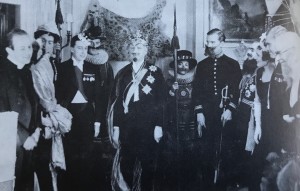
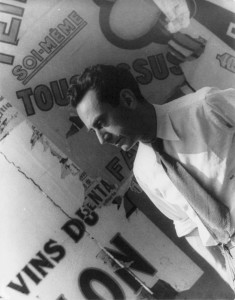 Another in the series “I once met” and the sub category “I once danced with..” used when the meeting was only with someone who knew the person (almost always famous.) This is a reference to the popular song “I danced with a man who danced with a girl who danced with the Prince of Wales.” An earlier Jot concerned a meeting with a
Another in the series “I once met” and the sub category “I once danced with..” used when the meeting was only with someone who knew the person (almost always famous.) This is a reference to the popular song “I danced with a man who danced with a girl who danced with the Prince of Wales.” An earlier Jot concerned a meeting with a 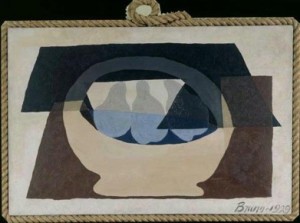 Found – Society Racket: A Critical Survey of Modern Social Life (Long, London 1933) by Patrick Balfour (Baron Kinross) – a journalist. At the time of this book he was ‘Mr Gossip’ at the Daily Express and the character Adam in Waugh’s Vile Bodies was probably partly based on him (Adam becomes ‘Mr Chatterbox’ at the ‘Daily Excess’.)
Found – Society Racket: A Critical Survey of Modern Social Life (Long, London 1933) by Patrick Balfour (Baron Kinross) – a journalist. At the time of this book he was ‘Mr Gossip’ at the Daily Express and the character Adam in Waugh’s Vile Bodies was probably partly based on him (Adam becomes ‘Mr Chatterbox’ at the ‘Daily Excess’.)